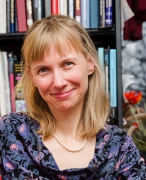Awards
- Bicentennial Medal - 2020
- Distinguished Professor - 2016
- National Academies - 2011
- American Association for the Advancement of Science
- Titled Professor - 2007
- Victor H. Yngve Professor of Information Science

Born in Germany, Katy Börner completed her Technical School Examinations at RFT Fernmeldewerk Leipzig, her Master of Engineering at the University of Technology Leipzig, and her Ph.D. in Computer Science at the University of Kaiserslautern. She joined the departments of computer science and library and information science at Indiana University as visiting assistant professor in 1998, was named Associate Professor in 2005, and the Victor H. Yngve Professor in 2009. She is visiting professor of the Royal Netherlands Academy of Arts and Sciences. At IU, she is affiliated with the Advanced Visualization Lab, the Center for Research on Learning and Technology, Center for Social Informatics, Biocomplexity Institute, Founding Director of Cyberinfrastructure for the Network Science Center, and is a member of the Scientific Leadership Team of the IU Network Science Institute.
Professor Börner is 'the leader', "a pioneer" and "a visionary" in the emerging area of knowledge domain visualization. Scholars, scientists, and scientometricians need tools for both analyzing and conceptualizing the patterns that are emerging in science, and "that is what Katy is one of the planet's leaders in doing." Professor Börner is particularly interested in the study of the structure and evolution of scientific disciplines, the analysis and visualization of online activity, and the development of cyberinfrastructures for large-scale scientific collaboration and computation. Börner's work cuts across multiple disciplines "†computer science, information science, social science, digital humanitiesâ€" as well as diverse subfields, including scientometrics, network science, geography, education, and information visualization. Börner's team created open data sources including the Scholarly Database with 28 million paper, patent, and grant records; the NSF funded, Science of Science (Sci2) Tool with more than 180 algorithms used by researchers and science policy makers; and free educational resources such as the Information Visualization MOOC to analyze, model, and visualize the structure and dynamics of science in a scientifically rigorous manner. In addition, Börner and her international colleagues developed and updated the UCSD Map of Science classification system that supports the science-location of scholarly records on a topic map of science.
Börner's work "greatly extends beyond the academic community to broader sectors, including the federal government and the public at-large" she has dedicated much of her efforts to promoting scientific understanding to the public." Author or co-author of more than 180 peer-reviewed publications, her "powerful and influential" monograph Atlas of Science: Visualizing What We Know was the Best Information Science Book of 2011 (Association for Information Science and Technology). Börner has presented her work at more than 500 academic, industry, and government events including the World Economic Forum, TEDx, TTI/Vanguard, Good Experience Live (Gel), the Cannes Film Festival, and the World EXPO in Milan in October 2015. Börner has curated the international traveling exhibit Places & Spaces: Mapping Science; the exhibit features 100 maps by 236 mapmakers, displayed at 252 venues, in more than 23 countries, on six continents, and its website serves more than 50,000 unique visitors each month. In addition, more than 200 news stories about the exhibit have appeared in major media outlets such as Wired Science, USA Today, Scientific American, and The Chronicle of Higher Education.
Börner is a member of the Department of Commerce Data Advisory Council, Fellow of the University of Duisburg-Essen DFG-Graduiertenkolleg on User-Centered Social Media, and Fellow of the American Association for the Advancement of Science. She has received an NSF CAREER Award and has received more than $10 million in funded research support from the National Science Foundation, National Institutes of Health, National Bureau of Economic Research, Bill & Melinda Gates Foundation, National Endowment for the Humanities, Google Inc., National Academy of Science, and US Department of Agriculture, among others. "Simply put, she is a visionary with boundless energy and determination, elite technical skill, savvy public engagement, creative inspiration, and personal warmth."